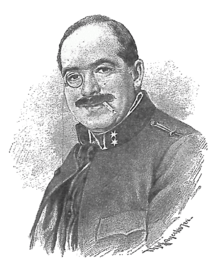Alexander Roda Roda
| Alexander Roda Roda | |
|---|---|
 | |
| Born |
Šandor Friedrich Rosenfeld April 13, 1872 Drnowitz, Moravia, Austro-Hungarian Monarchy (now Drnovice, Czech Republic) |
| Died |
August 20, 1945 (aged 73) New York City |
| Nationality | Austrian |
| Occupation | Writer |
Alexander Roda Roda (born Šandor Friedrich Rosenfeld; April 13, 1872 – August 20, 1945) was an Austrian writer.
Biography
Roda Roda was born as Šandor Friedrich Rosenfeld in Drnowitz, Moravia, Austro-Hungarian Monarchy (now Drnovice, Czech Republic). His sister was the physician Gisela Januszewska. As a child, he moved with his family to Slavonia. He Germanized his name from Šandor to Alexander, and his surname from Rosenfeld to Roda Roda. Roda is the Croatian word for stork. He chose his new surname because storks nested on the chimney of his house in Esseg (today Osijek). He spent more than 30 years living and working in Osijek and Slavonia.[1] In 1894, Roda Roda converted from Judaism to Catholicism.[2] In 1902, Roda Roda quit the military career and became a journalist (during World War I he was war correspondent); he contributed to the German satitrical magazine Simplicissimus. In 1938, he emigrated to the USA. He wrote many comedies (Der König von Crucina, 1892; Bubi, 1912, with Gustav Meyrink), tales and novels (Soldatengeschichten, 2 volumes, 1904; Der Ehegarten, 1913, Der Schnaps, der Rauchtabak und die verfluchte Liebe, 1908; Die Panduren, 1935), and autobiographical books (Irrfahrten eines Humoristen 1914–1919, 1920; Roda Rodas Roman, 1925). He died in New York City. Until his death, Roda Roda considered Esseg to be his hometown.[1]
Bibliography
- 1892 – Der Gutsherr von Ljublin
- 1906 – Eines Esels Kinnbacken
- 1908 – Von Bienen, Drohnen und Baronen
- 1909 – Bummler,Schummler und Rossetummler
- 1913 – 500 Schwänke
- 1925 – Roda Rodas Roman, Roda Roda erzählt
- 1927 – Donner und Doria
References
- 1 2 "Biografija: Alexander Roda Roda" (in Croatian). essekeri.hr.
- ↑ Kaiser, Max: "Roda Roda (bis 1899 Rosenfeld, 1899–1906 Roda), Alexander (Sándor) Friedrich (seit 1894 zusätzl. Ladislaus) (Pseudonym Aaba Aaba, Nikolaus Suchy)", Neue Deutsche Biographie 21 (2003), pp. 687–689 (German)
External links
| Wikimedia Commons has media related to Alexander Roda Roda. |
- "Roda Roda, Alexander", list of works
- Catalogue of printed works and manuscripts, Wienbibliothek im Rathaus
- Works by Alexander Roda Roda at Open Library

- Roda Roda at the Internet Movie Database